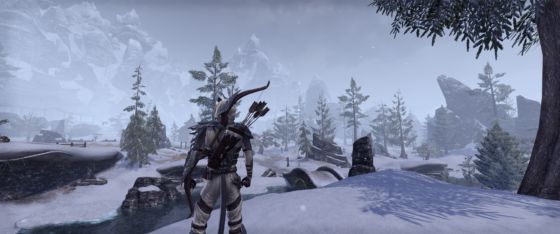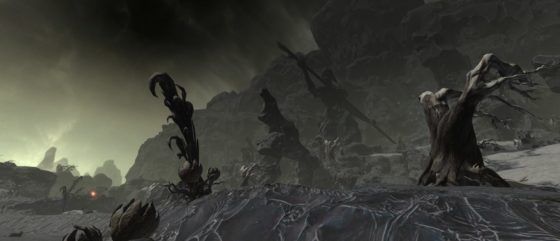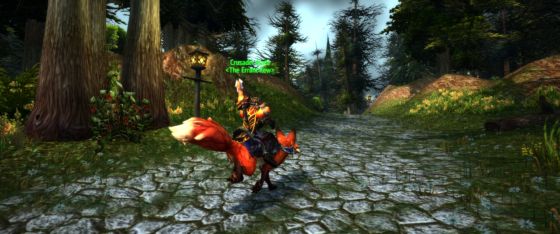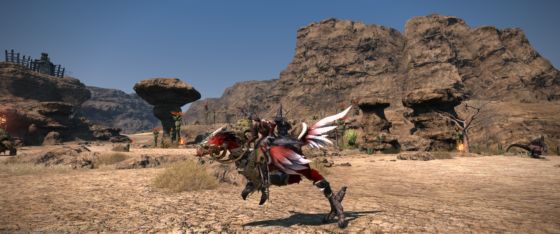One of the biggest and most impactful changes to MMORPG design over the last decade is one that's gotten remarkably little attention: the shift from skill based character progression to character level based progression. This was a shift that brought with it not just significant changes to the way characters are progressed and designed, but a mandate on the types of content that an MMO's virtual world would offer going forward. As its grip on MMO design coalesced over time, I would argue that this mandate has largely resulted in consequences that did more harm than good.
So what exactly am I talking about? It's important to be clear that when I say "skill based progression", I'm not talking about skill in terms of the player's ability to control their character, but rather the actual mechanics behind a character's progression. Are you simply filling a single bar and seeing your character progress from level 12 to level 13, or are you managing a list of various skills and proficiencies that all level independently?
The latter is what I mean when I talk about a skill based leveling system, and it should sound pretty familiar to anyone with a bit of experience playing RPGs. As I've written about before, though, sometimes it feels like MMOs are afraid of their RPG roots, and this is one of the biggest examples.
MMO designers over the past decade have seemed to eschew the genre's origins, presumably out of a fear that the added complexity and general wonkishness of these features turn off players to whom having to manage RPG features could feel like busywork in the larger scheme of the game's design ecosystem. But like any good ecosystem, changes in one area often end up forcing consequences in another.
Your Character's Journey from a Unique Creation to a Cardboard Cutout

It's hard to say whether this particular consequence was intentional or otherwise, but the systematic removal of meaningful customization has been the most direct result of the shift away from skill based character progression in the genre. At this point, it would be easy to draw a comparison between a completely skill based system like RuneScape and a character based system like World of Warcraft, where the difference would be most stark, but even a comparison between Vanilla WoW and WoW Legion would be dramatic.
During World of Warcraft's lifespan, every system that was even vaguely reminiscent of the genre's RPG roots has been watered down or outright removed, whether it be the need to level individual weapon skills or the staggering simplification of the game's talent trees into something almost indistinguishable from the simple system used in Blizzard's MOBA, Heroes of the Storm.
There are certainly arguments to be had on how beneficial these changes ended up being. The new, limited talents are definitely more impactful on average than those in the old talent tree system, but the removal of the ability to put points into any tree and choose a balance that fits your character has also dealt a huge hit to the amount of customization available and the player's feeling of uniqueness in the virtual world. It's an intangible, but I'd argue that when you have thousands of players in one place together, it's important that they have a way to at least feel that the character they've worked so hard on is somewhat unique.
Homogenizing player characters has certainly been a boon for balance though, and I suspect this a large part of what set us down this path to begin with. Grouping players into classes instead of widely varied amalgams of skill combinations allowed developers to approach builds in terms of a toolkit that was a collection of skills. Then the individual skills were removed and instead we raised our character levels, using talents trees to set ourselves apart. Then the talent trees were removed and turned into talent tierings, where we chose one new talent every few levels irrespective of where we'd invested points in the past. And somewhere along that journey, non-combat skills fell forgotten by the wayside as well. We gained a bit of balance and the games became easier to understand, but was it worth everything we lost along the way?
A Cast-off World

The shift from leveling skills to leveling your class set off a number of seemingly unrelated design changes, starting with the design of the world itself. With players now only worrying about leveling their character, their path through the world became much more linear, and as a result, so did the worlds they inhabited.
In a skills based MMORPG, leveling is done, rather intuitively, by actually using the skills you want to level. Want to level your sword skill? Go hit things with a sword. Want to level your archery skill after that? Well, you're going to have to grab a bow and go back to a beginner area until you master the weapon.
With that in mind, game worlds were designed with reuse in mind. You weren't grinding through quests that were good for precisely one run through; you were grouping up and tackling challenging elites, delving into dungeons, and progressing in a way that felt a lot more similar to a modern MMO's endgame - and the world was designed to reflect that.
But following the shift to consolidating leveling into simply raising a main character level, replayability became unnecessary, and worlds were restructured to offer a much more guided, cast-off experience centering around quests. After all, you no longer needed the experience you gained to be specific to your character's skills, so any generic source would do. Quests happily grew to dominate that arena.
I've tackled this in-depth before in How MMO Quests Get it All Wrong, but suffice it to say, when leveling changed to be done primarily via questing, the quests themselves took a massive hit in quality. Quests were no longer epic journeys fraught with adventure and danger, but quick and streamlined jaunts bespoke for the lowest common denominator. Quests changed from their own form of challenging content to being part of a tutorial-esque rite of passage, holding your hand all the way to an endgame that would come to be seen as the start of the "real game".
When the Endgame Became the Only Game

This is really the point where everyone started to view the endgame as the "real game", and leveling as something of an extended, weeks long tutorial. It makes sense, too. In a skills based system, there generally isn't that same notion of a cap. On a 1-100 leveling system, these games are generally balanced more around players having relevant skills sitting in the 30-50 range, with serious increases to experience requirements that make capping out a skill a much larger investment than the few days or weeks a character level based game generally asks of its players. Plus, with the number and variety of skills available, a truly capped player is often more of a theoretical proposition than an actuality - just look at EVE Online, where maxing out everything would take just shy of 30 years. But when we switched to character level based progression, that all changed.
This status quo where the endgame is designed as the "real game" has become one of the most widely panned elements of the MMORPG genre, and rightly so. It's an absolutely garbage idea, and it's staggering that it's infected as many games as it has. Did designers really think that placing a giant road block in front of players that wasn't at all representative of the type of content that typifies MMOs was a good idea? Did they really think it was good for their games to pack them with filler instead of focusing on the types of content the players had actually showed up to experience?
Now there were multiple factors leading to the MMORPG endgame's ascendance to "the only thing that matters" status, and you can't just pin it all on the shift to character level based progression. In all likelihood, they share the same impetus - the desire for balance. And not just in terms of builds, but in creating an even playing field where players are all at the same predictable level of progression, as well. Shifting the focus of your game design to content that's only completed after everyone is maxed makes sense if you want to ensure fairness. It's almost necessary if your game design centers on having a competitive raid scene. Balance in an RPG however, is fundamentally an exercise in windmill tilting, and one has to wonder if the costs have been worth the pursuit.
Is Skill Based Leveling Making a Comeback?

Thankfully, there has been some evidence that the genre is moving to reclaim a portion of its RPG roots. Two of the most successful MMOs of the last generation have made small movements back in the direction of skill based leveling progression. Final Fantasy XIV's multiclassing makes a great analog to the old skill based system and necessitated a world with some replayability built into it so that players would have something to do when they went back to level their other classes. The Elder Scrolls Online, despite making the baffling choice to include locked down classes in an Elder Scrolls title, features a variety of skill lines that are leveled independently of the character's regular combat level.
Outside of triple-A titles, the comeback is much stronger. Sandbox Interactive's Albion Online, which just launched its final beta and is rapidly approaching its full release, brings with it a complete and total return to skill based progression. The hotly anticipated self-described throne war simulator Crowfall does the same, taking an approach that's time-based (ala EVE) instead of grind based.
Will this be a trend in the next generation of MMOs? Will we see games like Ashes of Creation and Amazon Games Studios' New World take up the mantle to roll back the character level based progression paradigm as well? With all the talk of reactive sandbox worlds, it would sure make sense to see progression systems that encourage their reuse. Here's hoping it happens.